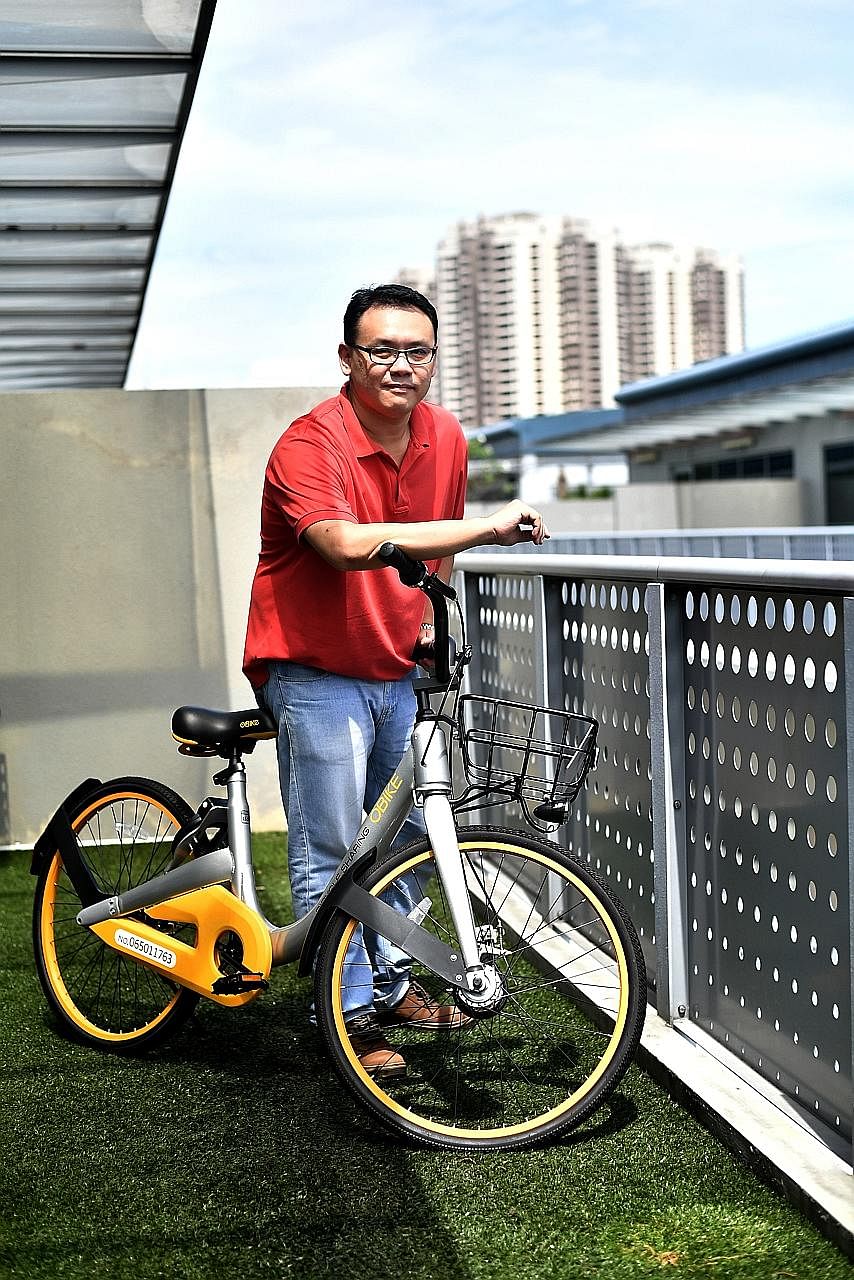When plans for a government- backed bicycle-sharing scheme were shelved two months ago, Singapore-based oBike decided to continue with its own plans.
The scheme, which was to have been launched at the year end, had attracted tenders from 13 firms, including oBike.
oBike's plan under the scheme was for a conventional docked system, where bicycles are rented from and returned to docking stations.
It was not keen on the docking stations but had included them in documents it submitted before the tender closed in December last year.
"We wanted to support government initiatives, but docking stations have their limitations," said oBike general manager Elgin Ee, pointing to the cost of building the infrastructure needed.
So the firm pushed ahead with its own dockless shared two-wheelers - where an app is used to locate, pay for and unlock the bikes. This was in January this year, even as oBike was being considered for the government plan.

Today, oBike has about 500,000 registrations and "a few thousand" bicycles, according to Mr Ee. It operates out of a small office in Commonwealth Lane and hires about 20 employees.
The 38-year-old, who holds a mechanical engineering degree from Nanyang Technological University, said the firm hopes to introduce "tens of thousands" of its two-wheelers here by the next quarter.
Mr Ee, who served as the head of marketing at Grab between 2014 and 2015, said he saw opportunities in Singapore's national bike-sharing scheme, first announced in 2014, while working for a travel firm in Myanmar.
He saw the possibility of dockless bike-sharing systems, which were making their mark in China, being introduced here.
He teamed up with the firm's co-founders, developed the app and started operations in January.
Mr Ee declined to say more about the firm's founders, though The Straits Times reported in January that two of the firm's directors are from Shanghai.
Mr Ee said oBike will have to co-exist with its competitors here - Chinese firms ofo and Mobike - adding that he expects more firms to enter the fray.
It is "too early" to say whether the Singapore market has enough space for more than one bike-sharing firm, he added.
The bike-sharing sector has attracted big money from investors, with Mobike and ofo raising more than $400 million and $620 million respectively in their latest rounds of fund raising.
Mr Ee, however, declined to say how much funding oBike has raised, but pointed out that the firm's expansion last month into the Klang Valley in Malaysia and Taitung City in Taiwan would not have been possible without significant capital. "Our financials are sound," he said.
Misuse of shared bicycles is a growing concern as the sector continues to expand.
oBike's bicycles, for example, have been found with their seats and handlebars damaged, and the bikes have been thrown into canals.
Mr Ee said oBike will increase the size of its maintenance crew, who go around the island to maintain and relocate bicycles, as the firm continues to grow.
It is also working with the authorities to address issues such as vandalism and indiscriminate parking of its bicycles.
"Most of the town councils are okay, but some are adopting a wait-and-see approach," said Mr Ee, adding that the firm has already signed agreements with Tampines and Jurong-Clementi town councils.
He is optimistic that as bike-sharing makes bicycles more accessible, more people will see cycling as a mode of transportation rather than as a leisure activity.
"It used to be that if you didn't own a bicycle, you would have to go to a park to rent one. Now you can get a ride from anywhere," he said.
He noted that in certain areas, cycling could prove to be a faster, more convenient mode of transport than taking the bus.
"Once people get in the habit of riding bicycles, they will start to see it as a form of commute."

